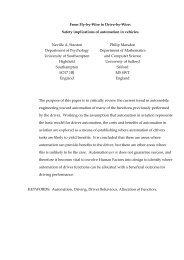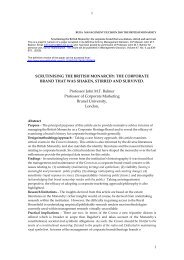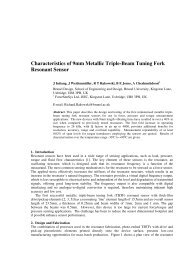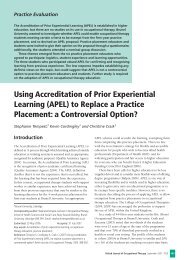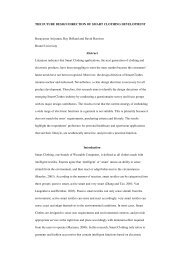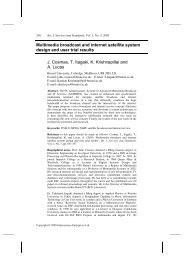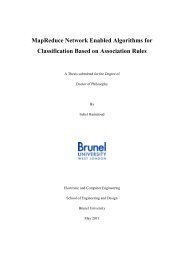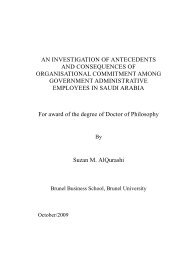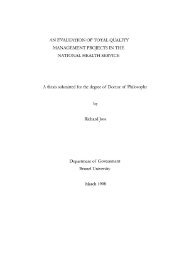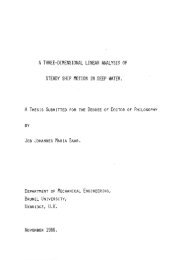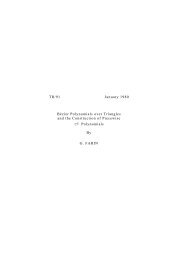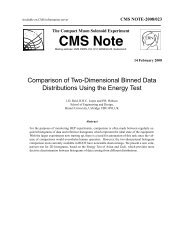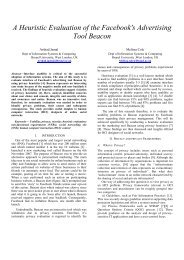Chapter 1 - Brunel University
Chapter 1 - Brunel University
Chapter 1 - Brunel University
Create successful ePaper yourself
Turn your PDF publications into a flip-book with our unique Google optimized e-Paper software.
<strong>Chapter</strong> 2: Literature Review<br />
Several e-government definitions concentrate on the benefits of delivery of<br />
government services and information electronically for citizens, business and<br />
employees. These are mentioned in brief in Table 2.4.<br />
Table 2.4:<br />
Definitions Focusing on the Benefits of E-government<br />
Definitions/Description – Benefits Characteristics References<br />
―E-government is defined as the implementation of costeffective<br />
models for citizens, industry, federal<br />
employees, and other stakeholders to conduct business<br />
transactions online. The concept integrates strategy,<br />
process, organisation and technology‖.<br />
―E-government involves access to government<br />
information and services 24 hours a day, 7 days a week,<br />
in a way that is focused on the needs of our citizens and<br />
businesses. E-government relies heavily on agency use<br />
of the internet and other emerging technologies to<br />
receive and deliver information and services easily,<br />
quickly, efficiently and inexpensively‖.<br />
Focus is on benefits<br />
of e-government via<br />
cost reduction.<br />
Emphasis is on the<br />
integration concept in<br />
e-government.<br />
Focus is on the<br />
benefits of delivering<br />
government services<br />
electronically.<br />
Whitson and<br />
Davis, (2001)<br />
Ke and Wei,<br />
(2004)<br />
Below are a few e-government definitions that consider citizens and their needs as<br />
an important remit of e-government and seek to position customers at the centre of<br />
focus.<br />
Table 2.5:<br />
Definition Focusing on Citizens<br />
Definitions/Description – Citizen Focus Characteristics References<br />
―An e-government is a government that makes full use<br />
of the potential of technology to help put its citizens at<br />
the centre of everything it does, and which makes its<br />
citizens its purpose‖.<br />
―E-government as seamless service delivery to citizens<br />
or governments‘ efforts to provide citizens with the<br />
information and services they need by using a range of<br />
technological solutions‖.<br />
Focus is on putting<br />
the citizens and their<br />
desires at the centre.<br />
Focus is on providing<br />
seamless services to<br />
citizens.<br />
Waller et al.,<br />
(2001)<br />
Burn and Robins,<br />
(2003)<br />
Below are a few e-government definitions that focus on the delivery of government<br />
services through a single point of access, i.e. the Internet.<br />
Table 2.6:<br />
Definitions Focusing on the Internet as a Single Point of Access<br />
Definitions/Description – Single Point of Access Characteristics References<br />
―Utilising the internet and the World Wide Web for<br />
delivering government information and services to<br />
citizens‖.<br />
―E-government is usually explained as a way of<br />
improving the delivery of government services by<br />
making them available through a single point of access<br />
on the internet, i.e. also called as ‗one stop shop‘<br />
shopping‖.<br />
Focus is on the<br />
internet for delivering<br />
services.<br />
Focus is on the<br />
internet as a medium<br />
for single point of<br />
access for delivery of<br />
service.<br />
UNDPEPA/ASP<br />
A, (2002)<br />
Mitchinson,<br />
(2001)<br />
Shafi Al-Shafi 21



